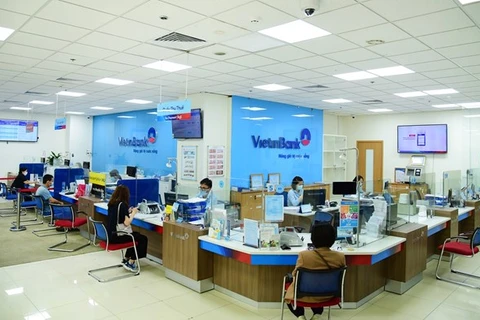
A customer deposits at Techcombank. Techcombank's current account savings account (CASA) ratio declined sharply from 50.5 per cent at the end of 2021 to 37 per cent at the end of 2022. (Photo courtesy of Techcombank)
Demand deposits at banks are mainly from customers’ payment accounts. Previously, due to low interest rates on term deposits, a number of customers did not pay much attention to transferring idle money in their payment accounts to term deposit accounts. Banks, therefore, raced to lure customers with many incentive policies to benefit from the low-cost capital source.
However, the trend has changed after interest rates for term deposits sharply surged to hit nearly 10% per year, which has caused more customers to select term savings to get higher interest rates.
According to the Q4 2022 financial report of banks, up to 23 out of 28 banks, even big names, have recorded a decrease in CASA ratio last year.
Specifically, Techcombank, which topped in terms of CASA for many years, saw its CASA ratio decline sharply from 50.5% at the end of 2021 to 37% at the end of 2022.
Despite surpassing Techcombank to top the CASA list in 2022, MBBank also reported a CASA decline from 44.6% at the end of 2021 to 37.6% at the end of 2022.
According to Techcombank, the CASA ratio dropped sharply because customers have tended to reduce cash holdings for investment or spending, but increase opening term savings accounts in the context of the global high interest rate environment, restricted liquidity of the banking system and negative sentiment on the real estate and bond markets.
However, Techcombank noted, the bank took measures to increase its term deposits to ensure capital, with Q4 2022 seeing a growth rate of 32.3% in term deposits against Q3 2022.
Many other banks also recorded a sharp drop in CASA ratio in the past year such as KienlongBank (from 15.5% to 4%), VietABank (11.9% to 4.1%) and TPBank (23.3% to 18%).
However, there were still some banks recording an increase in CASA ratio in 2022 compared to 2021 such as VietinBank (with a slight increase of 0.1 percentage point to 20%), PG Bank (with a 2.5 percentage point increase to 17.9%), and Bac A Bank (with a 3.9 percentage point rise to 7.3%).
Economist Dinh Trong Thinh said that the term deposit interest rate has continuously increased, especially in the last quarter of 2022, while other investment channels such as securities, real estate, gold, and cryptocurrencies have been less attractive and continuing the downward trend for a long time.
“This was why cash flows look to long-term savings channels to enjoy high interest rates. As a result, the amount of demand deposits decreased sharply, and the input capital also became more expensive,” he said.
According to Thịnh, improving the CASA ratio, controlling capital costs, and concentrating resources to support firms and people to recover production and business are posing big problems for banks, especially in the context of interest rates being forecast to remain high in the first half of 2023. Because when interest rates are high, individual customers transfer their idle money into term savings instead of keeping them in current accounts. As for firms, high interest rates made it difficult for them to access bank capital, thereby they had to withdraw available cash to serve their operations.
According to experts of Vietcombank Securities Company (VCBS), the State Bank of Vietnam’s policy interest rates in 2023 may not increase further. After peaking in the first half of 2023, the rates will be flat and gradually cool down in the second half of this year.
Sharing the same view, Yuanta Vietnam Securities Company (Yuanta) believes as the interest rate on term deposits is still high and the liquidity of the banking system remains limited, the growth of demand deposits will be low in the first half of 2023. However, Yuanta expects the CASA ratio to improve further as deposit rates gradually cool down in the second half of this year.
Besides, Yuanta said in the context of rising interest rates, banks with the advantage of a high CASA ratio such as MB, Techcombank and Vietcombank will suffer less negative impacts on net profit margin than banks with a low CASA rate.
Meanwhile, SSI Securities Company’s experts are more optimistic as, based on data analysis, they forecast the CASA ratio will be affected adversely only in the short term and will recover in the near future./.
VNA























